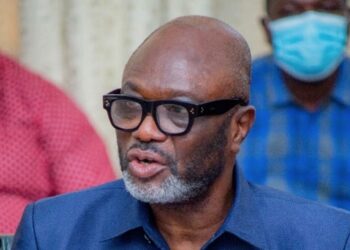Minister for Communications and Digitalisation, Mrs Ursula Owusu-Ekuful (MP) says the gross underrepresentatn of girls in Science Technology Engineering and Mathematics (STEM) disciplines is not just an educational challenge but a developmental concern which needs to be addressed if we are to harness the benefits technology offers for our people.
She made particular reference to a 2017, UNESCO report in 2017 titled “Cracking the code: Girls’ and women’s education in STEM”, which estimated that only 35% of STEM students in higher education globally are women, and differences are observed within STEM disciplines and specific countries. ”
“The picture is even more worrying when it comes to information and communication technologies. It is estimated that only 3% of female students in higher education opt for information and communication technologies (ICT) studies which also means women make up just a fraction of the workforce in these STEM related fields. It is also estimated that women hold just 24% of all jobs in the digital economy as at 2018 and the statistics have not changed” she added.
Mrs Owusu-Ekuful was speaking at the 75th Anniversary of the St Monica’s Old Students Association (SMOSA) at the Fiesta Royale Hotel in Accra today, 4th September, 2021 as the guest of honour. It was under the theme: ‘Educating Girls in the World of Technology’.
She stressed the need to bridge the digital gender disparity especially in the era where technology drives everything and STEM careers are the jobs of the future, driving innovation, social wellbeing, inclusive growth and sustainable development.
“Nation building requires the contribution of all, and technology is the key driver of growth and economic and social transformation in the recent history of the world.
The COVID pandemic has taught us that. Even though we see prospects, the digital revolution is revealing an underrepresentation of women in terms of contributing to this transformation”, she noted.
Key Interventions by Government
Minister indicated that government through the Ministry of Education complemented by the Ministry of Communications and Digitalisation over the years has sought to remedy the situation by introducing some interventions targeting access, STEM, gender, application of ICT and administrative arrangements. These include:
· Free Education Policy
· The Science, Technology and Mathematics Education (STME) Clinic
· Establishment of the Girls’ Education Unit
· Establishment of Science Education Unit
· Launch of gender responsive teaching in mathematics and science
· Integration of ICT as a tool for resourceful management for effective teaching and learning
· Scholarship schemes
Mrs Owusu-Ekuful said in spite of these interventions, women are still underrepresented in STEM activities and there is still a wide digital gender gap. To address the digital gender gap, there is a need to increase access to the internet by investing in infrastructure to extend coverage in underserved areas, increase levels of digital literacy through ICT education and ensure online safety by intensifying awareness creation.
The Role of the Communications and Digitalisation Ministry (MoCD)
According to Mrs Owusu-Ekuful, the world is technology driven and “we are transitioning to a virtual way of living. Our ability to adapt to innovative ways of doing things is essentially important to our survival. Technology has proven to be the key to improving what we do and derive maximum benefits from it. We have been able to manage this pandemic because of the role technology played and is still playing”.

The Ministry of Communications and Digitalisation, she says is poised to facilitate the adoption and use of technology in all sectors of the economy, including education, as part of the digital transformation agenda to engender efficiency, improve productivity and facilitate growth.
DIGITAL INFRASTRUCTURE
She revealed that the foundation for connectivity is infrastructure. She says government among other things is erecting 2016 Rural Telephony Project sites to provide coverage for the unserved and underserved areas of the country.

GENDER SPECIFIC INTERVENTIONS (DIGITAL LITERACY)
Minister noted that digital adoption and use can also offer women, and girls, in particular, opportunities to overcome hurdles they may face in the physical world adding, digital access can empower women and girls, help expand their sense of self in the world, increase civic engagement, and raise awareness of their rights. “It will also facilitate flexible working hours, enabling women combine their caregiving roles and careers effectively, working from home with digital platforms”.
CYBER SECURITY
Mrs Owusu-Ekuful encouraged girls to take an interest in technology. “It is important to remind everyone that several risks have been identified associated with digital technology, including online harassment from strangers (such as unsolicited messages), cyber-bullying, cyber stalking, unsolicited sexual messages or images, non-consensual sharing of intimate ideas, child sexual exploitation and abuse, as well as data security and privacy risks. Women and girls are at greater risk of digital harm” she noted. Data from the National Cyber Security Centre (NCSC) she revealed, indicates that over 90% of incidents relating to non-consensual sharing of intimate images, online blackmail and sextortion are reported by young women.

“Government is taking cybersecurity seriously because it has potential to undermine all the gains we have made with respect to the use of technology, especially by women and girls. In this respect, the Cyber Security Law has been passed, there is also provision made for dedicated funding for the Authority” she said.
She commended the St. Monica’s Old Students Association (SMOSA) for their continuous support to the school, especially with regards to the current initiative to support the building of an ultra-modern library and ICT centre.

Send your news stories to dannyboy744@gmail.com and via WhatsApp on +233 266777777














